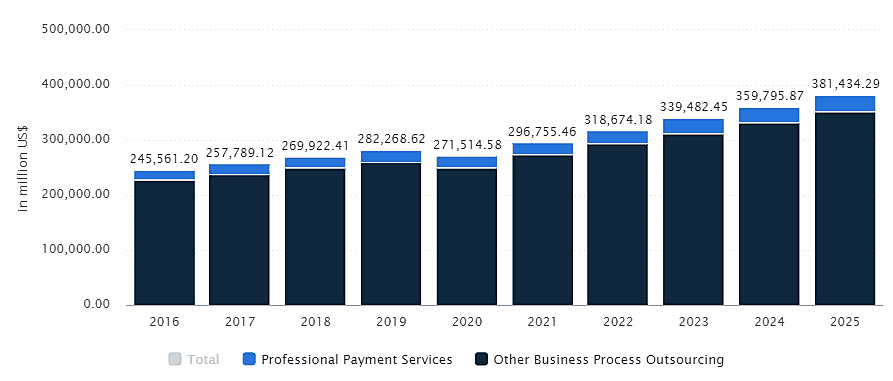A foresightful business would always research for ways to excel the quality and efficiency of a company. But with technologies redefining business activities, bulking up recruitments for each task is usually not cost-efficient for any business. Decision-makers are familiar with how technological advancements transform firms from good to better; this is why a business needs to invest on tasks without necessarily recruiting employees every time a job that requires special awareness or innovation is identified within the company. This is why you should learn about what BPO is and why your business must be considering its practise when trading in the digital age.
What is BPO?
Business Process Outsourcing, abbreviated as BPO, is the action of subcontracting third party vendors to perform business-related tasks-maybe an operational activity of hiring a service. It is a way of using assistive third parties to gain the maximum benefits from your business through multifaceted task-handling by out-based experienced people. There are three main ways to locate third-party vendors’ organisations:
Offshore: In any other country other than the country of the client company
Onshore: In the same country where the client company is based on
Nearshore: Located in the neighbouring country of the client company
Regardless of the location of BPO service providers, there is always an unprecedented opportunity available for client companies in the digitally reinventive approaches taken by third-party vendors. Therefore, BPO can allow a business to grow innovatively and improve the value-added services and tasks to be enriched and well-managed. BPO practices are used to mitigate activities in two main areas: the front office and the back office.
Worldwide businesses are starting to acknowledge the importance of BPO for businesses. Fascinatingly, statista.com reveals the statistics of the revenue generated by BPO services to have a compound annual growth rate (CAGR) from 2020 to 2025 of 7%, which indicated the revenue generated by BPO services globally in 2025 is estimated to be 381,434.29 million US dollars. The full chart is displayed below.

What is the reason behind these rising rates of reliance on BPO services?
BPO services have the propensity of handling repetitive tasks or menial tasks that would only add more stress to the employees in a company. For example, a company would often find handling a call centre in business premises complicating the business tasks since CRM requires special attention and skills. Such a business can connect with outsourcing call centres to add value and quality for their task while the company can direct their entire focus to business core competencies. This results in acknowledging outsourcing as a method used by companies to uncomplicate tasks and assure that all menial tasks are carried out effectively. Other examples of outsourcing services are:
- Sales Process Outsourcing,
- Operations Management Outsourcing,
- Research Process Outsourcing,
- Knowledge Process Outsourcing,
- Human Resource Management and Training Outsourcing
- Legal Process Outsourcing,
- Insurance Business Process Outsourcing,
- Virtual Tour Servicing, and more
Advantages of BPO
Cost-efficiency
Outsourcing business activities directly affect cost-cutting and clear directive taken in efficiency-oriented objectives. Businesses can invest in talents without recruiting them for specific tasks, cutting down a lot of costs and duties in supplying for employees. Stretching your existing employees too thin would hinder your employee retention rates, but off-premises-working employees that are based in the third vendor’s business is not the client company’s responsibility.
Top-notch service deliveries
The skills of outsourced companies are more skilful than the minor employee teams that work collaboratively in companies to complete certain operations. The outsourcing companies have better work-centric employees that are housed in their businesses, who are specialised in specific tasks and better-experienced. This enables the services to be exerted with better quality assurances and streamline performances or production in the outsourced activities.
Flexibility
Bolstering services through scaling inward business teams is plausible, but if implemented wrong can result in changing predefined plans and changing budgets for expenditures incurred on training programmes. But if a BPO service provider is hired to do the same tasks, the company would not be taking any risks, and the flexibility of the business’ core operations is mitigated since the minor procedures are handled by the experts. On-demand services that pop-up with the growth and maturity of ongoing projects can quickly be handled by outsourcing. The outsourcing companies will bear the responsibility of scaling talent pools and carrying out activities via a project-based labour force while allowing the client company to make rigid and incisive budget allocations. The client companies can define strict compliances that must be followed by the outsourcing companies and plan the inhouse activities accordingly.
Major time-saving
One of the advantages that can’t be overlooked by BPO is the advantage of saving time. BPO service enablers save the time used by employees in the company to do specific tasks. The client company can effortlessly invest their resources in getting the maximum advantage from the talents, skills and experiences of their employees. The saved time can also be used for upskilling your employees. On the other hand, BPO firms use the understanding of employees in digital fields to utilise their dedication in carrying out the activities of the client company.
Competitive advantage
Outsourcing gives companies- especially SMBs- the advantage of having a head start and move furthermost compared to their competitors. All the multi-faceted efficiencies granted by BPO will help the client businesses to grasp the competitive advantage. They can emphasise on fundamental functions such as account management, VIP customer service, and mission-critical endeavours to be confined to in-house activities.
Disadvantages of BPO
As there are ups and downs in everything, BPO can have negative impacts if companies do not choose competent third-party vendors. Three main disadvantages are briefly explained.
- Monitoring Issue
It is challenging to verify that all employees based in the BPO company are working to their fullest potential; the client company cannot monitor manpower-efficiency, especially if the BPO company is an offshore business. - Organisational Barriers
If the client and the outsourcing company have vast locational differences, there can be language barriers, diverse understandings on the same fields and clashing time zones. - Risks
Last but not least, the company takes a risk by sharing sensitive data with an unrelated business body. The outsourcing company can jeopardise the client company through data theft. The latter must, therefore focus on taking predetermined security and legal measures to safeguard the company data to evade this risk. (i.e. client companies can use, copyrights, patents, lawyer drafts, privacy terms agreements and other required procedures).
In conclusion, the disadvantages can be disposed of by companies if they select authentic BPO service providers since it would be negligent to say that companies today can survive in the dynamic economies without an extra helping hand. Take enough time and research on what are the activities that can be handed to outsource service enablers to mitigate and expedite your business’ growth. BPO services are hence a rising assistive aspect in helping your company to strive for higher goals in lesser time frames.






